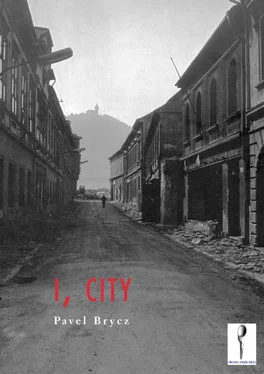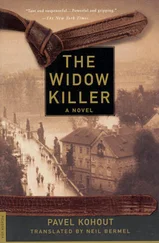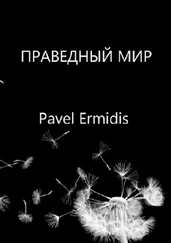Pavel Brycz - I, City
Здесь есть возможность читать онлайн «Pavel Brycz - I, City» весь текст электронной книги совершенно бесплатно (целиком полную версию без сокращений). В некоторых случаях можно слушать аудио, скачать через торрент в формате fb2 и присутствует краткое содержание. Год выпуска: 2006, Издательство: Twisted Spoon Press, Жанр: Современная проза, на английском языке. Описание произведения, (предисловие) а так же отзывы посетителей доступны на портале библиотеки ЛибКат.
- Название:I, City
- Автор:
- Издательство:Twisted Spoon Press
- Жанр:
- Год:2006
- ISBN:нет данных
- Рейтинг книги:5 / 5. Голосов: 1
-
Избранное:Добавить в избранное
- Отзывы:
-
Ваша оценка:
- 100
- 1
- 2
- 3
- 4
- 5
I, City: краткое содержание, описание и аннотация
Предлагаем к чтению аннотацию, описание, краткое содержание или предисловие (зависит от того, что написал сам автор книги «I, City»). Если вы не нашли необходимую информацию о книге — напишите в комментариях, мы постараемся отыскать её.
Dubliners
I, City
I, City — читать онлайн бесплатно полную книгу (весь текст) целиком
Ниже представлен текст книги, разбитый по страницам. Система сохранения места последней прочитанной страницы, позволяет с удобством читать онлайн бесплатно книгу «I, City», без необходимости каждый раз заново искать на чём Вы остановились. Поставьте закладку, и сможете в любой момент перейти на страницу, на которой закончили чтение.
Интервал:
Закладка:
“I was then still a shy young man, a virgin who’d never been kissed, when my classmate Ráchel Šmidtová invited me to a lecture given by Rabbi Glick at the Jewish Town Hall on Maiselova.
“Well, men, you know it from Appollinaire, don’t you? It’s the one with the tower with the clock whose hands go backward, because time, flying forward, is only time lost, a time that approaches death, whereas Jewish time recedes always to birth.
“But back to Miss Šmidtová… Something about her got under my skin, but the whole time I thought it was only the prick of the peaks of her bosom. It’s only now that I realize it was her Jewish star. She got me spiritually somewhere that would take me years of climbing to reach, if I would’ve had to do it all on my own.
“This was accomplished by only a single lecture from Rabbi Glick. She got me there, where the body and sex begin.
“I was a bit apprehensive when I entered the lecture hall, full of white chairs. Sitting on the chairs were members of Prague’s Jewish community: a wonderful people of an olive complexion, with hooked noses and dark hair. The women were so beautiful that you went cross-eyed. And the men wore their trousers with suspenders, and had on yarmulkes — as if they came from the time of Paradise, before the pogroms. They were running backward, too, just like the hands of the clock.
“I tell you, with my freckles, fair hair and blue eyes, I looked like the pope in a synagogue, but they saw me differently.
“I didn’t look like them on the outside, and so they seemed to believe that my Jewishness was hidden within. And the hidden soul of a man is for the Jews more important than the crust of his skin.
“Then Rabbi Glick began. He talked about a return to the faith. He spoke in English, with such an impossible accent that I couldn’t understand a word.
“Under his English words rattled something Hebrew, maybe Yiddish, maybe even Adam, the first man, before Yahweh gave him the gift of speech so he could be understood by his first wife, Lilith, which didn’t quite work out.
“But my classmate Ráchel Šmidtová understood him, and from his every rattling she managed to translate the right words to Czech. She was from Adam’s rib, so she understood.
“ ‘Zahlen Sie, bitte, Milena Jesenská, noch einmal, noch einmal, once more, please, translate for me — my pillow to Czech,’ one of Kafka’s poems, written to Milenka in a letter of May 30, 1920, came to my mind.
“It was in that same letter that Kafka described his loneliness.
“ ‘Why, when looking at strangers, am I looking at something strange? Even when I’m acquainted, nothing changes.’
“But I’m digressing, and you don’t want to be kept in suspense.
“Rabbi Glick was telling a story for assimilated Jews. And that in every one of us, maybe even in Hitler, there is something assimilated, though we may have committed the most horrible atrocities. His words were taking root in my heart; green sprouts budding, leaves bursting forth, blossoms emanating from my breast.
“The story was about a young man named Aaron, who was being raised in a Tsar’s cadet school in Russia, as such was the practice of the Russian Orthodox: this was the way they decimated the Jews, taking them when they were still young and re-educating them to become soldiers of the Tsar, so that they would never raise weapons for the cause of their fathers, as did Samson with the long hair.
“Aaron hadn’t retained anything of his Jewish faith. He didn’t observe the holidays or the Sabbath; he didn’t read the Talmud or Torah; he didn’t know what it meant to be a Jew.
“One day, on leave in Moscow, Aaron met the Tsar.
“He didn’t know, to tell you the truth, that he was dealing with a Tsar, as the man didn’t have it written on his forehead, and what’s more was in disguise, as he liked to appear, to mingle with his subjects, to get to know them.
“Because it was Russia, Aaron and the Tsar began to compete in the drinking of vodka.
“Who out-drinks who and who falls under the table.
“They drank. Nu vot!
“They drank heroically. As the empty shots piled up, the Tsar was still ordering more. But a Tsar is a Tsar, he can buy himself a whole Lake Ladoga of vodka, a whole Baikal of the stuff, an entire Caspian Sea — Aaron ran out of cash.
“So Aaron got up, because he wasn’t falling under the table just yet, and went to the innkeeper to hock his saber.
“ ‘Here you are,’ he said to him. ‘Here’s a finger of our Batushka Tsar with which he shakes the world. How much vodka will it get me?’
“The innkeeper measured the saber with his eyes and said: ‘For Batushka’s talon, I’ll give you a whole flask — let me be the loser!’
“Aaron gave a cheer, grabbed the bottle and went to the Tsar. Bum, he resolutely set the bottle down on the table. He didn’t lose. He was lighter only his saber.
“But wait, gentlemen. Three days later when he had gotten over his hangover, the Tsar was stricken by a thought: what kind of an army is it that’s able to squander its weapons? An army without weapons is nichevo, nothing!!
“The Tsar again set out for Moscow.
“He left his native Peterhof, waved goodbye to the Tsarevna and the Tsaritsa, went on his white horse Roman — the noble Romanov on the noble Roman, an English thoroughbred with a university degree in equitation.
“None of us sitting here has ever sat so high as did Nicholas, this Tsar of Romanov descent.
“Friends, that’s called riding your high horse.
“Nicholas arrived at Moscow, avoiding the dive in which he’d met Aaron. He wasn’t in disguise. Instead, he headed with his entourage to the barracks for an inspection.
“And believe me, it was thorough, the Tsarist inspection.
“He made the whole garrison stand in line. He cracked his moustache like a cat-o-nine-tails, and eagle-eyed any breach of discipline in a soldier’s uniform or gear, making to immediately harass the offender.
“Until he approached our Aaron. Next to Aaron stood Moshe, whose tunic was missing a button.
“He’d given it to Rebecca the day before. ‘Rebecca, I know how much you like to unbutton them. Here you are, one as a keepsake,’ he’d told her.
“But the Tsar had little understanding for either Moshe or Rebecca. ‘Button, button, button!’ he roared as other people might roar: ‘Help, help, help!!’ or ‘Murder, murder, murderrr!!!’ Well, as if a whole war would depend on a button. Tsar Nicholas, with malice in his eyes, turned to Aaron and commanded him: ‘Soldier, chastise this private whose button is missing. Unsheathe your saber and stab him!’
“Yes, the absolutist emperor behaved just like this.
“None of his subjects would have had the courage to say a word. They wouldn’t have had the pluck to utter their own names, to babble even a letter. They all simply shut up. Luckily, Aaron immediately recognized the Tsar as the unknown drunkard; needless to say, he knew which way the wind was blowing.
“He’d had enough presence of mind before the arrival of the inspection to have made a wooden replica of the saber, which was sheathed in his scabbard.
“To the eye it looked like a fine sword and real enough, but he wouldn’t be able to kill with it, even if he’d wanted to. Poor Moshe didn’t know this; sweat trickled down his forehead. He thought he’d be killed for the sake of a stupid button.
“ ‘Allow me to speak, Your Majesty,’ Aaron said as he clicked his heels.
“ ‘Speak, soldier,’ Nicholas replied benevolently, with the sneer of a smile.
“ ‘I’ll unsheathe the saber and kill, as you command, Excellency, but only if Private Moshe is truly guilty. If he is innocent, let this saber of Kuban steel transform into wood!’ As he finished his speech, he unsheathed his wooden saber and poked a petrified Moshe in the chest.
Читать дальшеИнтервал:
Закладка:
Похожие книги на «I, City»
Представляем Вашему вниманию похожие книги на «I, City» списком для выбора. Мы отобрали схожую по названию и смыслу литературу в надежде предоставить читателям больше вариантов отыскать новые, интересные, ещё непрочитанные произведения.
Обсуждение, отзывы о книге «I, City» и просто собственные мнения читателей. Оставьте ваши комментарии, напишите, что Вы думаете о произведении, его смысле или главных героях. Укажите что конкретно понравилось, а что нет, и почему Вы так считаете.












